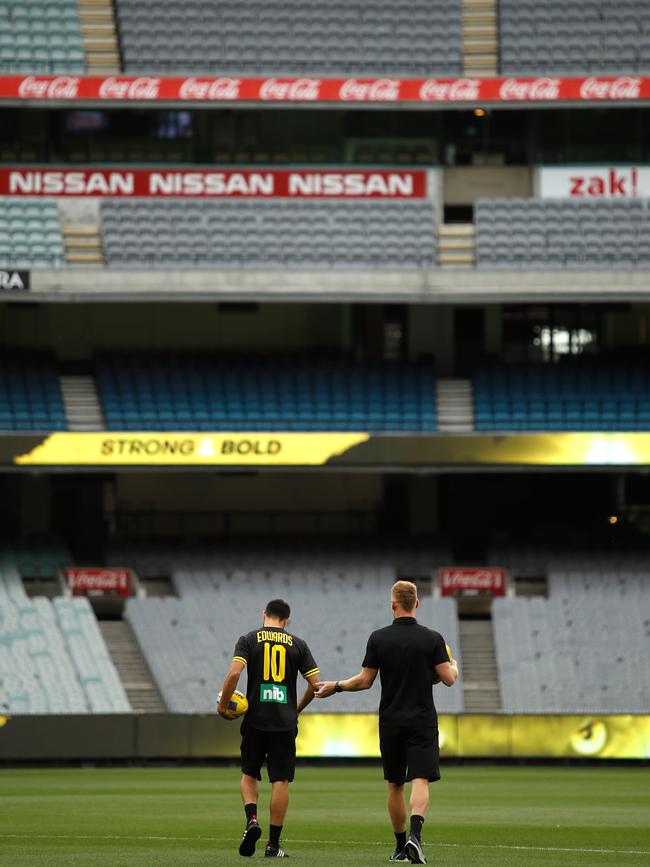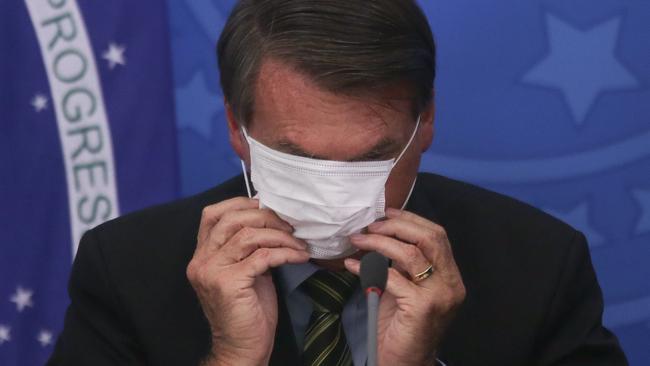David Penberthy: Why I’ve blocked out pandemic overload and choose to enjoy life
The word “coronavirus” has infected every area of life. But I’ve made a point of finding an hour a day that doesn’t involve “the thing”, writes David Penberthy. It’s actually been good.
Rendezview
Don't miss out on the headlines from Rendezview. Followed categories will be added to My News.
I saw a great photograph this week of a charity tin for the Royal Flying Doctor Service perched on a local pub’s front bar. It had a warning sign on that read: “Gold coin donation for anyone who mentions the coronavirus.”
Not saying the word “coronavirus” right now is easier said than done. It has infected every area of public and private life, right across the world.
Save for the Big Brother house in Germany, where the lucky contestants have been locked away madly fornicating and binge-drinking without knowing that it even exists, this is one of those rare moments in human history where, rightly or wrongly, it feels like we are facing an existential threat.
Processing something of that magnitude is a difficult task, and a new experience for those of us not old enough to remember World War II.
I mention World War II as, without wanting to downplay the enormity of the current challenge, this still isn’t the scariest moment in human history.
The march of Nazism across western Europe, the prospect of living in London through The Blitz, the end-of-war discovery of the scale and orchestration of the Jewish genocide … these facts from history are worth reflecting upon next time you’re freaking out in aisle six about the absence of toilet rolls.
I have skim-read a few articles on those fretful mother websites about how we should talk to our children about this virus.
Without wishing to sound ambivalent about my children’s welfare, I am more worried about how adults process it than the kids.
Obviously, I have been talking to my kids every day about how they’re feeling. They have different concerns.
My daughter is in Year 12 and is taking it in her stride. She has become frustrated by all the speculation about whether schools will stay open or close, but philosophical about the disruptions such as the postponement of the formal and the doubt surrounding whether there will be an audience at the school play.
My teenage son seems only to care about what it means for the footy season.
Out of the blue, my four-year-old said the other day: “What’s the coronavirus?”, confirming we are all talking about it incessantly, and prompting us to resolve to refer to it at home now as “the thing”. As in, sorry kids, we’re not going to the footy tomorrow, because of “the thing”.

The thing is, while kids seem to dip in and out on this story, and remain possessed with an enviable determination to have fun, there is a danger for adults in that we can get suckered into trying to comprehend this in its overwhelming totality and wind up in a permanently fixated and anxious state.
I am on a chat group with some mates, some of whom are medicos, who have spent the past week sharing different charts and graphs about infection rates, comparative curve-flattening efforts on a country-to-country basis, projected death tolls, other cheery stuff.
We share plenty of dumb jokes, too, but the general vibe of the chatroom is: So, how’s the apocalypse working out for you?
Reading about all this stuff is part of my job, and while I am quietly confident that I’m not yet insane, I have made a deliberate point these past few days of finding a full hour a day that doesn’t involve “the thing”.
It’s actually been good – one hour of listening to records, one hour of planting some vegies, one hour of planning a dumb movie festival at home for the kids over the coming weeks which is going to involve family screenings of Flying High, the Naked Gun trilogy and Blazing Saddles, the campfire scene from which will have special resonance given the record purchasing of baked beans from the nation’s supermarkets.

The other night when the ABC aired what was apparently a brilliant documentary about child abuse in the church, I apologised to my wife and excused myself to watch The Simpsons Movie in the spare room.
Writing in The Times this week, British journalist Clare Foges wrote the best account I have read of the modern phenomenon of over-saturation on what is a wholly miserable story.
It’s not an argument for staying uninformed. Rather, it’s an argument for reading the paper, tuning in and watching the news, without letting your media consumption turn into a debilitating form of OCD.
I leave you with her words. There is good advice in here for all of us.
“The most tempting, and dangerous, response is to obsessively tune in to 24-hour news and social media. I plead guilty to news-wallowing even in normal times.
“I’m talking beyond my cover-to-cover reading of The Times of checking the BBC news website every couple of hours, regular scrolls through Twitter, flicking on Sky News for updates.

“My eyeballs hoover up the breaking news ticker at the bottom of the screen with the urgency of a cocaine addict snorting a line. This condition has been exacerbated by the coronavirus pandemic.
“The junkie in me craves a bank of screens, as at NASA mission control, each flashing up the latest from all corners of the globe: Disneyland closing, no climbs up Everest, stock markets crashing. If a minor Finnish celebrity contracts the virus, I need to know this minute!
The coronavirus is to news stories what the megalodon was to fish: mind-bendingly enormous, the Big One. It is global, local, personal, political, dramatic, sensational, unpredictable.
“All killer, no filler. It is like one of those TV retrospectives of a whole decade, condensed into a single week. There are no slow news hours, let alone slow news days.
“After decades in which we have been primed for ever-greater sensation and ever more clickbaity drama, this story is a highly seductive thing. But there is a cost in news-obsessing: peace of mind.”
Originally published as David Penberthy: Why I’ve blocked out pandemic overload and choose to enjoy life

